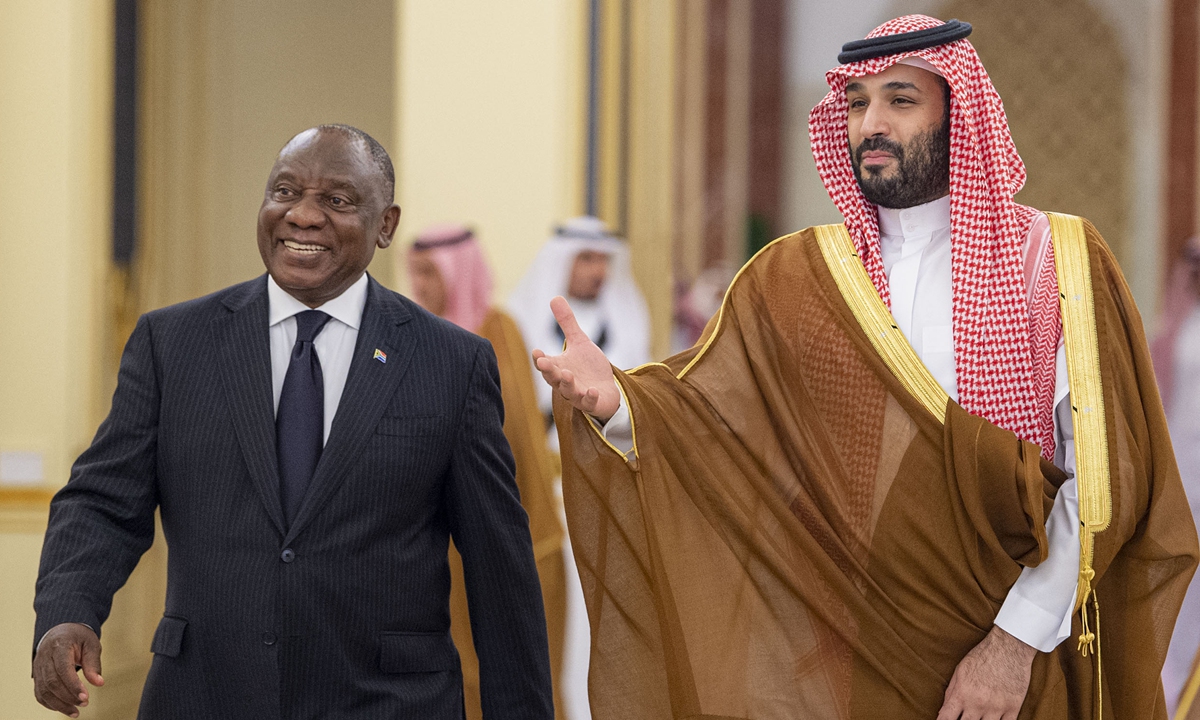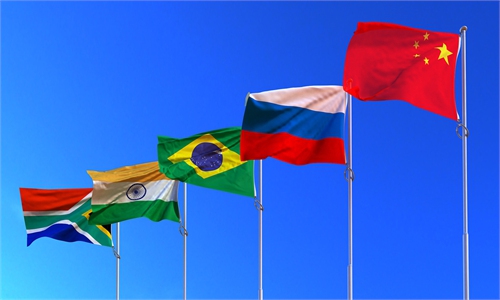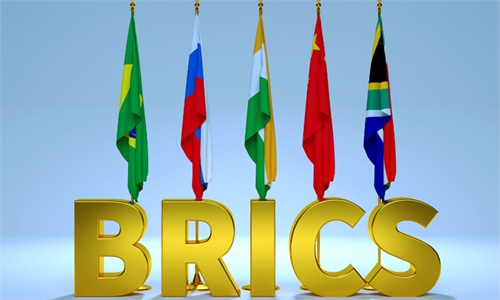US 'oil for security' formula faces setback as Saudi Arabia shows interest in joining BRICS

This handout picture released by the Saudi Royal Palace on October 15, 2022, shows Saudi Crown Prince Mohammed bin Salman Al Saud (right) receiving South African President Cyril Ramaphosa, at Al-Salam Palace in the Red Sea port of Jeddah. Photo: VCG
Amid an intensifying spat with the US on oil production, Saudi Arabia has expressed its "desire" to join BRICS (Brazil, Russia, India, China and South Africa), a move Chinese experts view as a setback for Washington's "oil for security" approach toward the Middle East and its increasingly reckless interference in other countries' affairs.
Citing South African President Cyril Ramaphosa, South Africa's local radio station ABC reported on Tuesday that Saudi Crown Prince Mohammed bin Salman Al Saud, who is also Saudi Arabia's prime minister, "did express Saudi Arabia's desire to be part of BRICS," and Saudi Arabia is "not the only country" seeking BRICS membership.
Ramaphosa paid a state visit to Saudi Arabia last week, during which the two countries signed agreements and memorandums of understanding worth about $15 billion, Reuters reported. South Africa will hold the rotating BRICS presidency in 2023.
Saudi Arabia's reported interest in joining BRICS comes as the country is locked in a diplomatic spat with the US over oil production.
Earlier in October, the Saudi-led OPEC+ announced that it will cut oil production by 2 million barrels per day, which will mean higher gasoline prices this autumn and winter, weeks before the US midterm elections. The Biden administration, which has invested massive political resources to halt the move that could threaten the Democrats' dim hopes in the election, later slammed the decision and called it "shortsighted," according to a CNN report.
A senior US official said on Sunday that US President Joe Biden has "no plans" to meet with the Saudi Crown Prince at next month's G20 summit in Indonesia, Aljazeera reported.
Meanwhile, Saudi officials have made it clear that they would not take orders from the US. The CEO of the Future Investment Initiative, the organizer of the "Davos of the Desert" Saudi investment conference, said on Monday that US government officials will not be invited to attend the event at the end of this month, according to media reports.
The US wanted Saudi Arabia to listen to its orders and meet its demands, but the fact proved that Washington has overplayed its hand, a Beijing-based international relations expert told the Global Times on Wednesday, requesting anonymity.
The US is completely utilitarian in its relations with Saudi Arabia, the expert said, adding that "the idea of joining BRICS shows Saudi Arabia's growing autonomy in its diplomacy with Washington."
It was not a difficult choice for the Saudis to make, given the US' domestic turmoil and the instability of the country's policies, the expert said, noting that "joining BRICS will also protect Saudi Arabia's own energy interests in a substantive way, rather than being a card to be used by others."
BRICS is a multilateral mechanism that brings together emerging market economies and embodies cultural diversity, political inclusiveness and economic mutual benefit. Being a member of BRICS would multiply Saudi Arabia's influence in global economic affairs as well as political and security affairs, analysts said.
"If Saudi Arabia joins BRICS, it would be a promotion to the Middle East countries to strengthen their ties with BRICS countries and weaken the intervention and influence of the US in the area," the Beijing-based expert said.
Li Shaoxian, director of the China Institute for Arab Studies at Ningxia University, told the Global Times on Wednesday that for Saudi Arabia, the "oil for security" framework with the US must be adjusted in light of the changing international situation, and it is more important now to "not put all its eggs in one basket."
The Middle East's global status is clearly elevated: Europe needs it for energy, Russia takes it seriously, and China has good ties with it on the Belt and Road Initiative, whereas "the Saudis do not feel equality and mutual respect in a US-led framework," Li said.
With a more intense metaphor describing US anger and possible retaliation, the Washington Post said Washington's knives "are being sharpened for Saudi Arabia."
Some US Democratic lawmakers have recently called for legislation that would immediately halt all arms sales to Saudi Arabia for one year. US Senator Chris Murphy, a member of the Senate Foreign Relations Committee, urged the US to suspend the sale of Patriot missiles to Saudi Arabia and repurpose these missiles to Ukraine, according to media reports.
Meanwhile, BRICS cooperation in various areas, including local currency settlements, is expanding, amid the US' weaponization of the dollar. During a video address to the BRICS Business Forum in June, Russian President Vladimir Putin said that Russia was exploring the possibility of creating an international reserve currency based on the basket of BRICS currencies.
Countries are fed up with the US, which uses its dominant dollar and power in stipulating rules to pursue hegemonism. As a result, more and more countries are willing to show their independence that differs from the US in the readjustment of the international financial order, Li said.
Saudi Arabia, which has a large sovereign-wealth fund in the US, would no doubt speed up the decline of petrodollar if it joins BRICS in the future, Li said.



